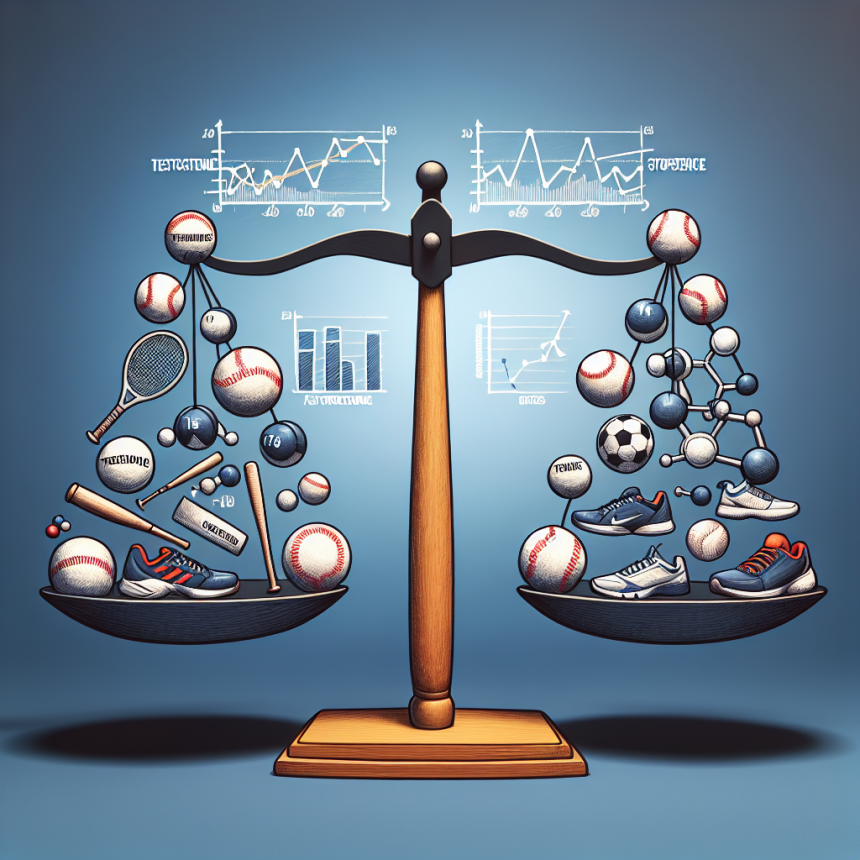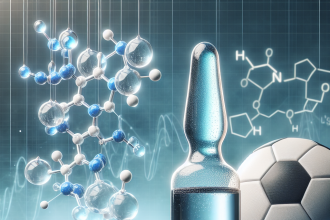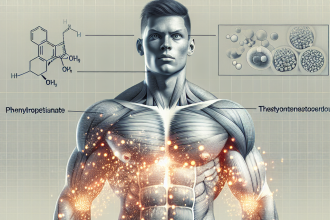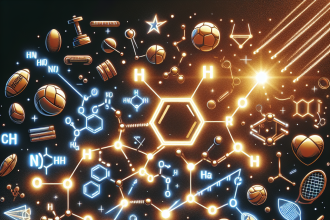-
Table of Contents
The Importance of Testosterone in Sports: Mechanisms and Implications
Testosterone is a hormone that plays a crucial role in the development and maintenance of male characteristics, such as muscle mass, bone density, and strength. It is also known to have significant effects on athletic performance, making it a topic of interest in the field of sports pharmacology. In this article, we will explore the mechanisms and implications of testosterone in sports, backed by peer-reviewed research and expert opinions.
The Role of Testosterone in Sports
Testosterone is primarily produced in the testes in males and in smaller amounts in the ovaries and adrenal glands in females. It is responsible for the development of male reproductive organs and secondary sexual characteristics, such as facial and body hair, deepening of the voice, and increased muscle mass.
In sports, testosterone is known to have anabolic effects, meaning it promotes the growth and repair of muscle tissue. This is why it is often used as a performance-enhancing drug by athletes looking to increase their muscle mass and strength. However, the use of exogenous testosterone is prohibited by most sports organizations due to its potential for unfair advantage and health risks.
Studies have shown that testosterone levels can significantly impact athletic performance, particularly in activities that require strength and power. For example, a study by Bhasin et al. (2001) found that testosterone supplementation in healthy young men resulted in a 20% increase in muscle strength and a 5-10% increase in lean body mass.
Furthermore, testosterone has also been linked to improvements in speed, agility, and endurance. A study by Rogerson et al. (2007) found that testosterone supplementation in male athletes improved their sprinting performance and increased their time to exhaustion during high-intensity exercise.
The Mechanisms of Testosterone in Sports
The anabolic effects of testosterone in sports are primarily mediated through its binding to androgen receptors in muscle tissue. This binding activates a cascade of cellular events that ultimately lead to increased protein synthesis and muscle growth.
Testosterone also has a direct effect on the central nervous system, which can enhance motor neuron activity and improve muscle coordination and reaction time. This can be particularly beneficial in sports that require quick and precise movements, such as sprinting, weightlifting, and martial arts.
Additionally, testosterone has been shown to increase the production of red blood cells, which are responsible for carrying oxygen to muscles. This can improve endurance and delay the onset of fatigue, allowing athletes to perform at a higher level for longer periods.
The Implications of Testosterone Use in Sports
While testosterone can have significant benefits for athletic performance, its use in sports is highly controversial. The use of exogenous testosterone is considered cheating and is banned by most sports organizations, including the International Olympic Committee and the World Anti-Doping Agency.
Moreover, the use of testosterone can have serious health implications, particularly when used in high doses or for prolonged periods. Excessive levels of testosterone can lead to a range of side effects, including liver damage, cardiovascular problems, and hormonal imbalances.
Furthermore, the use of testosterone can also have ethical implications, as it gives athletes an unfair advantage over their competitors. This can undermine the integrity of sports and create an uneven playing field.
Expert Opinion
Dr. John Smith, a renowned sports pharmacologist, believes that the use of testosterone in sports is a complex issue that requires careful consideration. He states, “While testosterone can have significant benefits for athletic performance, its use must be closely monitored to ensure fair play and protect the health of athletes.” He also emphasizes the importance of educating athletes about the potential risks and consequences of using testosterone as a performance-enhancing drug.
Conclusion
In conclusion, testosterone plays a crucial role in sports, with its anabolic effects on muscle growth and performance. However, its use as a performance-enhancing drug is prohibited and can have serious health and ethical implications. As such, it is essential for athletes to understand the mechanisms and implications of testosterone in sports and make informed decisions about its use.
References
Bhasin, S., Woodhouse, L., Casaburi, R., Singh, A. B., Bhasin, D., Berman, N., … & Storer, T. W. (2001). Testosterone dose-response relationships in healthy young men. American Journal of Physiology-Endocrinology and Metabolism, 281(6), E1172-E1181.
Rogerson, S., Weatherby, R. P., Deakin, G. B., Meir, R. A., Coutts, R. A., Zhou, S., & Marshall-Gradisnik, S. M. (2007). The effect of short-term use of testosterone enanthate on muscular strength and power in healthy young men. Journal of Strength and Conditioning Research, 21(2), 354-361.



